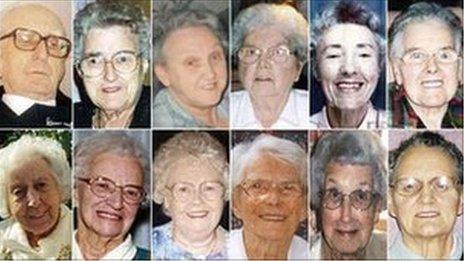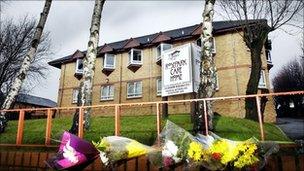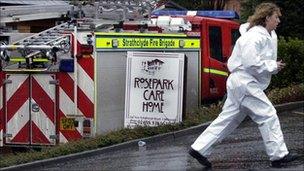Rosepark care home deaths 'preventable' inquiry finds
- Published

Thomas Cook, 95, Julia McRoberts, 90, Anna Stirrat, 82, Margaret Lappin, 83, Mary McKenner, 82, Helen Milne, 82, Isobel Maclachan, 93, Helen Crawford, 84, Annie Thomson, 84, Dorothy McWee, 98, Margaret Gow, 84, Isabella Macleod, 75
The deaths of 14 elderly residents in a care home blaze could have been prevented by a "suitable" fire safety plan, an inquiry has concluded.
The fire at Rosepark care home in Uddingston, South Lanarkshire, broke out in a cupboard on 31 January 2004 and ripped through the building.
A fatal accident inquiry said some residents may have been saved if the fire service had been called sooner.
The local health board was criticised for not detecting fire risks.
The residents who died in the blaze were Dorothy McWee, 98, Tom Cook, 95, Isobel MacLachlan, 93, Julia McRoberts, 90, Annie Thompson and Helen Crawford, both 84, Margaret Lappin, 83, May Mullen, Helen Milne, Anna Stirrat, and Mary McKenner, all 82, Robina Burns, 89, Isabella MacLeod, 75, and Margaret Gow, 84.
Charges dropped
An attempt to prosecute the home's owners, Thomas and Anne Balmer and their son Alan, over alleged safety breaches, collapsed in 2007 after a judge dismissed the charges.
A fresh indictment was served in 2008 but those charges were also dropped.
The fatal accident inquiry (FAI) began in February 2010 and finished taking evidence in August.
Sheriff principal Brian Lockhart has now delivered his findings following the 141-day probe.
He found that "some or all" of the deaths could have been prevented if the home had a "suitable and sufficient" fire safety plan.
Sheriff Lockhart concluded: "The management of fire safety at Rosepark was systematically and seriously defective. The deficiencies in the management of fire safety at Rosepark contributed to the deaths.
"Management did not have a proper appreciation of its role and responsibilities in relation to issues of fire safety."
He said the "critical failing" was not to identify residents at the home as being at risk in the event of a fire, as well as failing to consider the "worst-case scenario" of a fire breaking out at night.
'Inadequate arrangements'
A further "serious deficiency" was found in the "limited attention" given to how residents would escape from the home in the event of a fire.
The sheriff said an adequate fire plan would have revealed the problems which eventually led to the deaths, such as staff not being properly trained in fire safety and the presence of an electrical distribution board in a cupboard which opened to a "critical escape route" alongside flammable materials.
He also highlighted "inadequate arrangements" for calling the fire brigade, a lack of fire dampeners and too many people being housed in one corridor in order to evacuate them effectively.

Fire safety procedures at Rosepark were found to be inadequate and deficient
He said the risk assessment was "obtained in good faith" but contained a "serious error".
The inquiry also concluded that the lives of four of the residents - Isabella MacLachlan, Margaret Gow, Isabella MacLeod and Robina Burns - could have been saved if the fire brigade had been called as soon as the fire alarm sounded.
The women died later in hospital of conditions related to the smoke and gas they inhaled.
The inquiry, held at the Gospel Literature Outreach Centre in Motherwell, was told that the care home's practice meant a member of staff had to find the source of the blaze before dialling 999.
Staff waited nine minutes before they contacted the fire service.
An extra delay, of about four minutes, was added when the fire brigade went to the wrong entrance to the home.
'Reasonable precaution'
Sheriff Lockhart said: "Time is of the essence because even a small fire is capable of generating large volumes of smoke which could result in casualties."
It was "absolutely essential" that the fire brigade was called as soon as the alarm sounded.
He said there were "no circumstances in which one would condone a procedure that involved sending members of staff to look and see if there was a fire before calling the fire brigade".
For the alarm instead to have sent an automatic signal to the fire brigade would have been a "reasonable precaution".

The inquiry heard how there was a delay in calling the fire service
Mr Lockhart also recommended that Rosepark should have been given a special risk category by the fire service, meaning every watch at the local station would have visited it every year and been familiar with its layout.
He praised firefighters who tackled the blaze on the night, saying they "did everything in good faith and with dedication and heroism".
The fire broke out in a cupboard because of an earth fault with a cable passing through an electrical distribution board.
The inquiry found evidence of a "defect" in the maintenance of the electrical system, which caused the fire.
All the deaths would have been avoided if these had been installed and checked properly, the sheriff said.
Mr Lockhart continued: "Had there been a proper system of maintenance of the electrical installation, the inadequate installation at the back of the distribution board would have been identified.
"An adequate system of maintenance would have identified the defect and would have resulted in its rectification.
"The accident which caused the deaths would not have occurred. In that event all of the deaths would have been avoided."
The determination also criticised NHS Lanarkshire for its "deficient way of working".
He said problems with Rosepark's practices, including leaving residents' bedroom doors open at night, not calling the fire brigade immediately and failures in fire drill training for staff, should have been uncovered by the health board during its inspection.
He said: "Had these defects been discovered during inspections by the health board, the fire brigade would have been called immediately, the staff would have acted appropriately when the fire alarm sounded, bedroom doors would have been shut.
"The deficient system of working which I have identified on the part of the health board contributed to the deaths."
In his conclusion to the determination, Sheriff Lockhart noted "the very substantial developments which have taken place in respect of fire safety since the Rosepark fire".
He added: "I would like to say to the relatives of those who so tragically lost their lives in the Rosepark fire that all of us involved in the inquiry offer our sincerest sympathies.
"We express our admiration for the manner in which they conducted themselves through the long and difficult days when evidence was taken. This must have been particularly distressing to them.
"It is to be hoped that the evidence and this determination provides answers to their questions about this tragedy. We wish them all well."
- Published17 February 2011
- Published12 August 2010